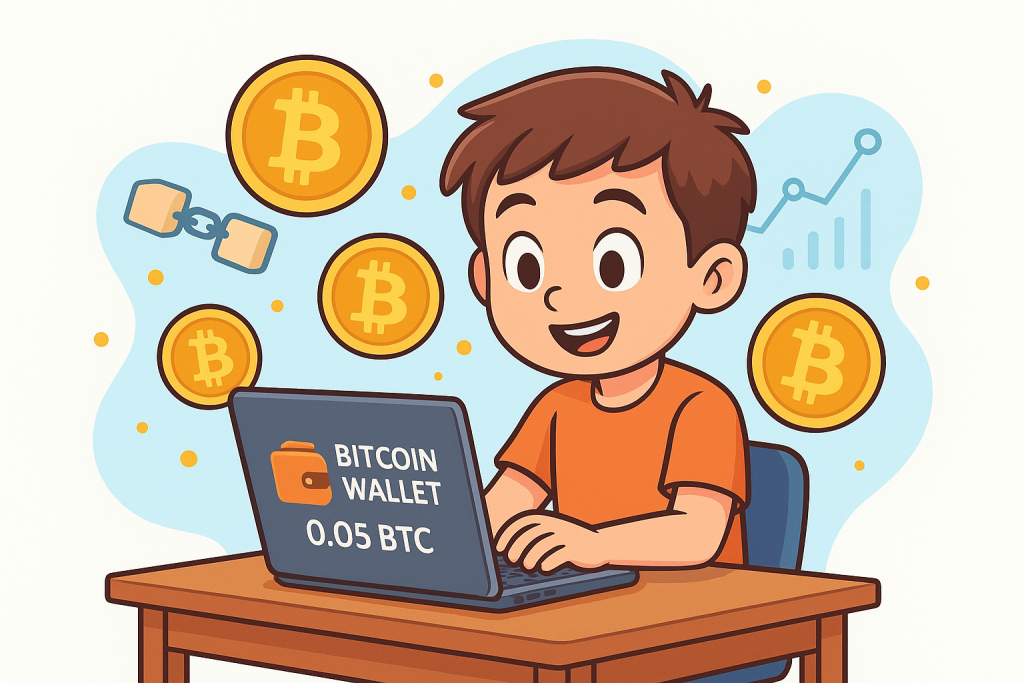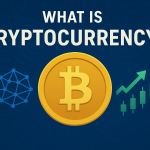1. Introduction to Bitcoin
In the last decade, one word has consistently dominated financial news, technology forums, and online discussions: Bitcoin. Born in 2009, Bitcoin is often called the future of money, a digital revolution, and even digital gold.
Unlike traditional currencies such as the U.S. Dollar, Euro, or Indian Rupee, Bitcoin is completely decentralized. This means it is not issued, controlled, or regulated by any government, bank, or financial authority. Instead, it operates on a technology called blockchain, which is a distributed digital ledger maintained by thousands of computers worldwide.
Bitcoin has not only become a global investment asset but also a means of payment and a way to earn online. From Bitcoin faucets that give out tiny fractions of Bitcoin for free, to freelancers being paid in BTC, to Play-to-Earn crypto games, the opportunities to earn Bitcoin online are vast and growing.
In this mega-guide, we will cover:
- What exactly Bitcoin is
- How Bitcoin works (explained in simple terms)
- How to earn Bitcoin online (both free and paid methods)
- Whether free Bitcoin earning is real or a myth
- Step-by-step methods to get started today
By the end, you will have a clear understanding of Bitcoin and practical methods to earn it safely.
2. What is Bitcoin?
2.1 The Basic Definition
Bitcoin is a digital currency (cryptocurrency) that allows peer-to-peer transactions without the need for banks or intermediaries. It was introduced by an anonymous individual or group under the name Satoshi Nakamoto in 2009.
Instead of relying on a bank to confirm your balance or a government to print money, Bitcoin relies on cryptographic proof and a network of users.
2.2 Why is Bitcoin Called “Digital Gold”?
- Like gold, Bitcoin is limited in supply. Only 21 million Bitcoins will ever exist.
- It acts as a store of value since it cannot be inflated like paper money.
- Many investors buy Bitcoin to hedge against economic uncertainty and inflation.
2.3 Bitcoin vs. Traditional Money (Fiat)
| Feature | Bitcoin | Traditional Currency |
|---|---|---|
| Issuer | Decentralized (no one) | Central Banks & Governments |
| Supply | Limited to 21M | Unlimited printing |
| Transactions | Peer-to-Peer | Bank/Middleman |
| Speed | Minutes (global) | Hours/Days (international transfers) |
| Storage | Digital Wallet | Physical Cash & Bank Accounts |
| Control | User-Owned | Government Controlled |
3. How Does Bitcoin Work?
Bitcoin may seem complicated, but we can break it down into three main parts:
3.1 Blockchain Technology
The blockchain is the backbone of Bitcoin. Imagine it as a public notebook that records every transaction ever made with Bitcoin.
- Every page of this notebook is called a block.
- Each block contains a list of transactions.
- When a block is filled, it is added to the chain, forming the blockchain.
- Once added, it cannot be changed, making it tamper-proof.
3.2 Mining and Proof-of-Work
Mining is the process that secures Bitcoin and creates new coins.
- Miners use powerful computers to solve complex mathematical puzzles.
- Once solved, they add a new block to the blockchain.
- As a reward, miners receive newly created Bitcoin + transaction fees.
This process is called Proof-of-Work (PoW).
3.3 Bitcoin Transactions
When you send Bitcoin:
- You create a transaction from your wallet.
- The transaction is broadcast to the network.
- Miners verify it and include it in a block.
- The transaction is confirmed and permanently recorded.
Unlike traditional bank transfers, you remain in full control of your money.
3.4 Bitcoin Wallets
To use Bitcoin, you need a wallet.
- Hot Wallets: Connected to the internet (e.g., apps like Trust Wallet).
- Cold Wallets: Offline, hardware-based (Ledger, Trezor).
A wallet has two keys:
- Public Key (like your bank account number)
- Private Key (like your ATM PIN – never share it)
4. Why Bitcoin is Valuable
Bitcoin’s value comes from multiple factors:
- Scarcity: Only 21 million will ever exist.
- Decentralization: No government can manipulate it.
- Security: Transactions are encrypted and nearly impossible to hack.
- Global Use: Accepted worldwide, borderless.
- Adoption: Increasing acceptance by companies, investors, and institutions.
5. Different Ways to Earn Bitcoin Online
Earning Bitcoin online can be divided into paid methods (work or invest) and free methods (faucets, airdrops, rewards). Let’s explore both.
5.1 Freelancing for Bitcoin
- Offer skills (writing, design, coding) on platforms like Cryptogrind, Bitwage, and LaborX.
- Clients pay in Bitcoin instead of fiat currency.
5.2 Bitcoin Faucets
- Small websites that give away free Bitcoin in exchange for completing simple tasks like captcha solving.
- Examples: FreeBitco.in, Cointiply, FireFaucet.
5.3 Play-to-Earn Games
- Crypto games reward players with Bitcoin or tokens that can be converted into BTC.
- Example: Satoshi’s Games, LightNite.
5.4 Affiliate Programs
- Promote Bitcoin services (wallets, exchanges) and earn BTC commissions.
- Example: Binance, Bybit affiliate programs.
5.5 Bitcoin Trading & Investing
- Buy low, sell high.
- Risky but profitable with knowledge.
5.6 Microtasks & Surveys
- Earn BTC by completing small online jobs.
- Platforms: TimeBucks, Bituro.
5.7 Browsing & Cashback
- Earn Bitcoin by simply browsing the internet (Brave Browser) or via crypto cashback (Lolli, Fold).
6. Can You Really Earn Bitcoin for Free?
Yes, but with limitations.
- Faucets give tiny amounts of BTC.
- Airdrops occasionally give free crypto (not always BTC).
- Giveaways exist but often full of scams.
- Mining with free apps is usually unprofitable.
👉 The truth: You can earn Bitcoin for free, but usually in small amounts. For significant earnings, you need to invest time, skill, or money.
7. Step-by-Step Guide: How to Start Earning Bitcoin
- Get a Bitcoin Wallet (Trust Wallet, Electrum, or hardware wallet).
- Choose an Earning Method (freelancing, faucet, affiliate, trading).
- Sign Up on Legit Platforms (avoid scams).
- Start Earning Bitcoin through tasks, work, or investments.
- Secure Your Earnings by transferring BTC to a private wallet.
8. Advantages of Earning Bitcoin
- Global accessibility.
- Potential for price growth.
- No bank restrictions.
- Easy transfers (peer-to-peer).
9. Risks of Earning Bitcoin
- Scams: Many fake websites promise free Bitcoin.
- Volatility: Price can rise or crash quickly.
- Hacks: Online wallets can be compromised.
👉 Always research platforms before using them.
10. Future of Bitcoin Earning
- Web3 Jobs: More crypto-related jobs will pay in Bitcoin.
- Metaverse & Gaming: Bitcoin rewards in virtual worlds.
- DeFi: Innovative lending/borrowing systems with BTC.
11. FAQs
Q1: Can I earn Bitcoin without investment?
Yes, via faucets, airdrops, and microtasks, but rewards are small.
Q2: Is Bitcoin mining profitable today?
Not for beginners without powerful hardware.
Q3: How much can you earn from faucets?
Usually cents per day, not large amounts.
Q4: Is Bitcoin legal?
Legal in most countries, but regulations differ.
12. Conclusion
Bitcoin is more than just a digital coin – it’s a revolution in money and finance. While you can earn Bitcoin for free, the amounts are small. The best long-term strategy is to learn skills, use freelancing platforms, or invest wisely.
Bitcoin may be volatile, but its importance is undeniable. Those who start earning or holding Bitcoin today could benefit greatly in the digital financial future.


